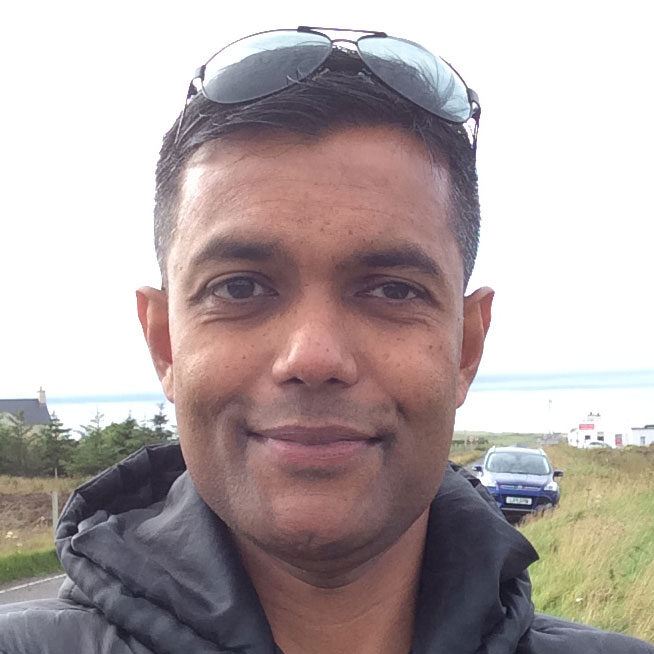Wet with the bucket of cold water he half-willingly poured on himself, he stands by the body of his father, palms together, naked to the waist, head bowed to the prayers of the priest with a piety he does not feel. He half-hears the priest, just enough to repeat after without tripping over the Malayalam-laced Sanskrit. The rest of him is occupied, distant.
Like the soul he has heard of but never seen, he hovers, flutters above, now by the five-tongued golden oil lamp that he himself lit a few minutes ago; now by the unbroken coconut ringed by pink petals resting on a bed of raw rice; now higher, over the heads of the believers and the non-believers, the leftists, the centrists and the rightists, the political and the less-political who throng the courtyard; now over the square pond with the quarter-dead water lily in it; now inside the home of his childhood, in the living room where his father had lain on display, wrapped and refrigerated for real in the rich red flag of his politics and philosophy; and now back, over the heads of the dry-eyed women crowding the portico to the priest in front sitting cross-legged on the red carpet. The red carpet is actually a red-coloured carpet, a hired, three-piece affair stained with the stress of many ceremonies, many births, many marriages, many deaths; and the priest a dark, young man who walks a tightrope between tradition and modernity — a Samsung smartphone in his black, executive bag, an apprentice at his call — linking the past with the present, the old with the new.
He notices the rawness on his father’s scraped left elbow, the open right nostril from where the cotton ball has fallen off… His father does not look asleep. He looks dead.
He half-kneels at the feet of his father, right knee on a plantain leaf placed there for the purpose. Awaiting the next instruction from the priest, he wobbles, catches his breath as pain shoots through his lower back violated by 29 hours of economy travel and airport chairs. From here he has a different view of his father.
He notices the rawness on his father’s scraped left elbow, the open right nostril from where the cotton ball has fallen off. He notices his father’s toes tied together with a string of white hospital dressing. The red wrap that covered his father has been removed, and he notices the iron starch of his father’s shirt, the crispness of his single mundu. He notices the whiteness of his father’s hair, trimmed close to the scalp, closer than he had ever seen. His father does not look asleep. He looks dead.
The consensus is that it was a good death, and he knows it too, as do his mother and sister, having watched at close quarters the panic in the eyes of a furiously independent man sinking into dependency. His father looks dead but peaceful.
The consensus is that it was a good death, and he knows it too, as do his mother and sister…
Seeing the priest chanting silently, he wonders what his father, the public atheist, would say of this holy man and the last rites. Somehow he does not think his father would mind terribly, for this is nattunadappu, tradition of the land, and in any case he has long suspected his father to be agnostic. He watches the crowd watching him, curious about the only son who left home for university and never came back, the son who does not weep at his father’s passing, and he half-marvels at his own detachment. He has clocked it as a way of coping, but he wonders about it now, at his ostensible lack of grief, his obvious relief, questioning his own earlier assumption, dissecting himself.
Then he sees someone he knows and his mind flits back to his father. He had forgotten his father’s politics. He recalls the posters paying homage to his father on his drive through the town, posters with a bad picture of his father, a horrible picture, on walls, on electric posts, at every major junction, and he feels gratitude to those who had remembered, made the effort.
He watches the crowd watching him, curious about the son who does not weep at his father’s passing…
His father was a difficult man, a volatile man, a tiresome man, a loud man, a quiet man, a cruel man, a kind man, a righteous man, a man hated more than he was loved, a man respected less than he was feared, formidable, complex, deceivingly simple. His father was a good man. All of that, all of his father, the sum of his life, all his complexities have now been reduced to a single digit, one death, a body in starched white, one future urn of ashes with a slice of skull and a fragment of femur that he will hold on the fifth day.
Still half-kneeling, he accepts the flowers the priest holds out. With wet hands and a disquieting finality, he begins to throw the pink, aruli petals on to his father’s body, in ones and twos, in time with rising chants.
This piece was first published in the Huffington Post India.

Previous Next